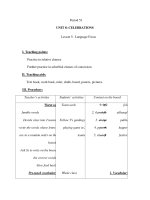Tải Giáo án Tiếng Anh lớp 9 Unit 8: Celebrations - Lesson 5 - Giáo án điện tử môn Tiếng Anh lớp 9
Bạn đang xem bản rút gọn của tài liệu. Xem và tải ngay bản đầy đủ của tài liệu tại đây (103.88 KB, 3 trang )
<span class='text_page_counter'>(1)</span><div class='page_container' data-page=1>
<b>PERIOD 53</b>
<b>LESSON 5: LANGUAGE FOCUS</b>
<b> </b>
A/ Aims<i>: Practice in relative clauses and adverbial clauses of</i>
<i>concession.</i>
B/ Objectives: <i>By the end of the lesson, Students will be able to</i>
<i>recognize and distinguish relative clauses and know how to use them in</i>
<i>various situations. </i>
C/ Teaching aids: <i>Textbook, handouts on additional exercises..</i>
D/ Procedure:
<b>Stages</b> <b>Teacher’s activities</b> <b>Students’<sub>activities</sub></b>
<b>I.Warm up</b>
5 min
<b>II.Presentation</b>
12 min
* Relative clause completion
- Ask Students to work in groups. Call at
random on members of the groups to complete
the sentences. Students can use their own ideas
but they have to make sense.
1. New Year’<sub>s Eve is the night when ………….</sub>
2. April Fools,<sub> Day is a day </sub>
when………..
3. May Day is the day when ………..
4. Father’<sub>s Day is the day ……….</sub>
5. July 4 is the day when ………..
1. Relatives clauses:
- Tell Students to identify a relative clause:
a) <b>Crowed holiday resorts are not very pleasant. </b>
<b>b) Holiday resorts which are crowed are not very</b>
<b>pleasant. </b>
=> <b>Crowed</b> in a is an adjective, <b>which are crowed</b> is a
clause The clause is doing exactly the same work as the
adjective: it is describing the holiday resorts. So we can
call it an adverbial clause or relative clause because it
relates to the noun, in this case, by means of the word
which. relative clauses can describe persons, things and
events: <b>Who, Which and When </b>
=> There are two kinds of relative clause in
written language.
* Relative clauses without comas are called
defining or identifying clauses. They provide
essential information about the subject or object.
Eg: What kind of book will be popular?
<i>The book which contains pictures</i>.
Work in groups
Listen and
identify the
relative clauses
</div>
<span class='text_page_counter'>(2)</span><div class='page_container' data-page=2>
<b>III.Practice</b>
8 min
6 min
7 min
<b>IV.Further </b>
<b>practice</b>
7 min
* Relative clauses with comas are called non-
defining clauses. They provide additional
information, which can be omitted.
Eg: <i><b>The book, which contains pictures, will be </b></i>
<i><b>popular </b></i>
<b>2. Exercises: </b>
2.1 Exercise: Join the sentences.Use relative
clauses:
- Have Students read the example aloud and ask
them to work in pairs to complete the sentences.
- Get them compare the answers with a friend.
- Call on some pairs to practice in front of class.
- Make necessary corrections and give feedback
2.2 Exercise 2: Describe each of the people in
the pictures. Use relative clauses
- Ask Students to study the pictures in the book
and use the relative clauses to describe each of
the people in the pictures.
- Call on some Students to read the examples
aloud.
- Have them work individually and exchange
their answers with their friends to correct.
- Call on some Students to read their answers
aloud.
- Give feedback
3. Adverbial clauses of concessions:
Though, although, even though + clause
These express the opposite ideas.
Example: Hai is not satisfied with his
preparations for Tet even though he has
decorated his house and made plenty of cakes.
3.1 Exercise 3: Join the sentences. Use the
words in the brackets:
* Notice: There is no but in the complex
sentences with though, although, even though
- Ask Students to work individually and
compare with their friends.
- Call on some Students to read their answers in
class
- Feedback and give correct answers
3.2 Exercise 4:
- Ask Students to look at the pictures, complete
the sentences by using though, although, even
Read and give
some more
examples
Work
individually and
in pairs
Demonstrate in
front of class.
Work
individually
Read their
answers aloud in
class.
Listen and copy
in their
</div>
<span class='text_page_counter'>(3)</span><div class='page_container' data-page=3>
<b>V.Homework</b>
2 min
though. Use the correct tense of the verbs and
information
- Have Students check their answers for each
other.
- Feedback and give correct Answers.
+ Let Ss redo all the exercises and copy them in
their notebooks.
+ Prepare the next lesson.
</div>
<!--links-->









